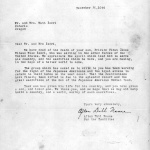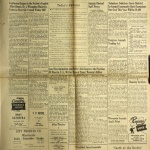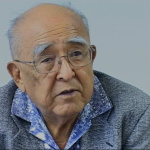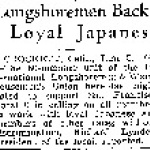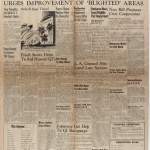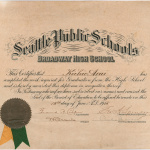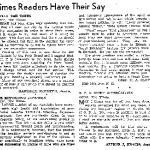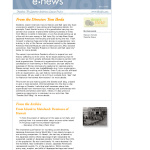Miles E. Cary
| Name | Miles E. Cary |
|---|---|
| Born | November 1 1894 |
| Died | August 12 1959 |
| Birth Location | Ortling, Washington |
Teacher, education reformer, and principal of McKinley High School in Honolulu, Hawai'i.
Personal Background
Miles Elwood Cary was born November 1, 1894, in Orting, Washington, and after his father's death at age seven, he and four other siblings were raised by his mother, Anna Cary. In 1912, Cary graduated from Edmonds High School where he met his future wife Edith Brackett, and after serving in World War I for six months, he returned to graduate from the University of Washington in 1917. That same year, he became principal and teacher in Morton, a town south of Seattle, and later worked in Ferndale, Washington, where Edith was employed as an elementary school teacher. During Cary's teaching career in Washington, he became exposed to revitalizing texts and teacher methodologies, emphasizing social and civic responsibility in the classroom, and promoting the idea of the school as the center of a community from which socialization and cooperative efforts could promote intellectual and civic growth.
After placement agencies recruited teachers in the Pacific Northwest to teach in Hawai'i, in 1921 the Carys decided to visit the Islands and soon relocated. Cary began working at McKinley High School—known as "Tokyo High" for its large numbers of Nisei students—in September 1921 as a history teacher and coach of the junior football, track, and basketball teams. [1] He later served as an advisor for the newly formed school newspaper, The Pinion . After a brief stint as principal of Maui High School, Cary returned to McKinley in 1924 as principal—a position that he would hold for the next twenty-four years. Cary would be a critical figure in the Americanization of Hawai'i's Nisei who embraced notions of equality and civic duty taught at McKinley explaining in part their activism during World War II.
Cary and McKinley High School
During his career at McKinley, Cary dramatically transformed the nature of public education with his radical educational philosophy that was influenced by his experience in Washington. While business leaders in Hawai'i encouraged vocational and agricultural education in public schools for the children of immigrant plantation workers, Cary advocated radical curriculum revision. Cary's progressive educational program replaced vocational training with a core curriculum that stressed the values of citizenship, initiative, individuality, leadership, and self-reliance while respecting the multicultural composition of the student body. According to historian Lawrence Fuchs, "the objectives were twofold: first, to center the teaching of English around real social problems; and second, to encourage democratic participation by students as they learned." [2] Thus, during Cary's administration, there were more than sixty extra-curricular clubs and organizations including the Debate Club, the Citizenship Club, student government, and the student newspaper. By 1929, half of the students belonged to one or more of its clubs. [3] As Iwao Mizuta, class of 1942 historian recalled, Cary engaged the students by "using the extra-curricular activities as a laboratory for the academic work and citizenship," communicating the ideals of democracy in practice. [4]
Poston and Postwar Activities
Following the outbreak of war, in 1942 Cary was asked to serve as the director of education for the euphemistically named Poston Relocation Center in Arizona. Although Cary believed that incarceration was an "immoral act," he organized educational programs at Poston that served more than 4,000 Japanese Americans. [5] When questioned about his work in Arizona, Cary noted some of the challenges that inmates faced:
It was a great privilege to work with those people. I had an opportunity to make those people understand what true democracy means to the common people all over the world. I tried to help them to be patient with people who have temporarily lost their heads. I tried to help them to keep faith in the future possibilities of life in America. It was an interesting year and a rough and tumble year. I found the youngsters over there grand to work with. In behavior, they are quite like the young people of Hawaii. Naturally, they were bewildered at first but made a fine comeback during the year. [6]
After one year, Cary returned to McKinley but his return to Hawai'i lasted only four more years. In September 1947, Cary left the Islands to assume a professional role in teacher education at the University of Minnesota. Four years later, he became director of the Ethical Culture/Fieldston Schools in New York but after two years, his contact was not renewed. Cary spent his remaining professional career working with both the University of Tennessee and the University of Virginia. He passed away on August 12, 1959, on the anniversary of Hawai'i's annexation fondly remembered by the students whose lives he impacted.
For More Information
Cary, Miles E. "A Vitalized Curriculum for McKinley High School." Master's Thesis, University of Hawaii, 1930.
---. "Educating for Democratic Living." Hawaii Educational Review 26.10 (June 1938): 293-95, 313-315.
---. "Education in Hawaii." Progressive Education 24 (April 1947): 218-21.
---. "Initiating Creative Curriculum Development." The North Central Education Quarterly 23.4 (April 1949): 345-46.
---. "Integration and the High School Curriculum." Ph.D. dissertation, Ohio State University, 1937.
---. "Intergroup and Interracial Education." The Bulletin of the National Association of Secondary-School Principals 32 (March 1948): 39-44.
---. "Learning Comes Through Living." Educational Leadership 4 (May 1947): 491-95.
---. "Purposeful Activities in the McKinley Senior High School, Honolulu." Education 53 (September 1932-June 1933): 261-68.
---. "The Core Studies and Community Activities." Educational Method 18 (March 1939): 272-75.
Creamer, Beverly. "Miles E. Cary." Honolulu Advertiser , July 2, 2006.
Fuchs, Lawrence H. Hawaii Pono: A Social History . New York: Hardcourt, Brace & World, Inc., 1961.
"History," President William McKinley High School website.
Robles de Melendez, Wilma J. Teaching Young Children in Multicultural Classrooms: Issues, Concepts, and Strategies . Clifton Park, NY: Thomson Delmar Learning, 2007.
Santoki, Mark M. "Iwao Mizuta: Reflections on the McKinley Class of '34 and the Legacy of Miles Cary." Hawaii Herald , November 1, 1991, p. 1.
Williams, Shirley JoAnn. "The Educational Theory and Philosophy of Education of Miles Elwood Cary: Implications for Democracy in a Global Civic Culture." Ed.D. diss, Northern Illinois University, 1991.
Footnotes
- ↑ Lawrence H. Fuchs, Hawaii Pono: A Social History (New York: Harcourt, Brace & World, Inc.), 129.
- ↑ Fuchs, Hawaii Pono , 287.
- ↑ Fuchs, Hawaii Pono , 286.
- ↑ Mark M. Santoki, "Iwao Mizuta: Reflections on the McKinley Class of '34 and the Legacy of Miles Cary," Hawaii Herald , November 1, 1991, p. 1.
- ↑ Wilma J. Robles de Melendez, Teaching Young Children in Multicultural Classrooms: Issues, Concepts, and Strategies (Clifton Park, NY: Thomson Delmar Learning, 2007), 170; Shirley JoAnn Williams, "The Educational Theory and Philosophy of Education of Miles Elwood Cary: Implications for Democracy in a Global Civic Culture" (Ed.D. diss, Northern Illinois University, 1991), 102.
- ↑ Williams, "Miles Elwood Cary," 101.
Last updated Dec. 13, 2023, 6:35 p.m..

